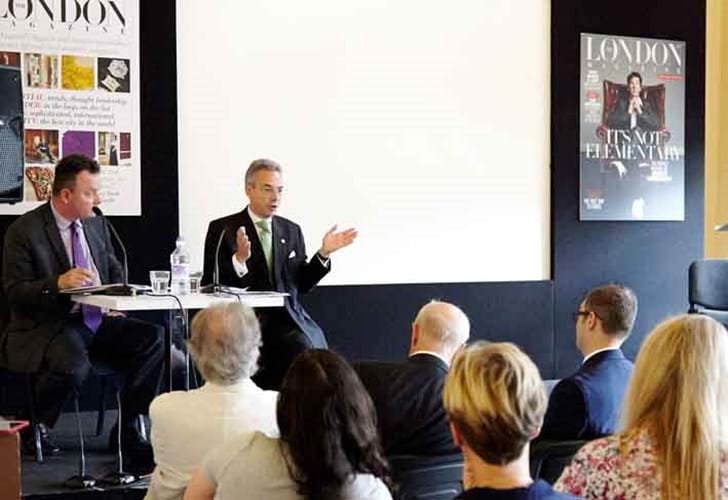
Council deputy leader Robert Davis explained what would happen over the next few months during the talk hosted by ATG that he gave at the summer Olympia fair last week.
The council hope to establish another Special Policy Area (SPA) centred on Cork Street and covering the area of Mayfair between Piccadilly and Oxford Street that, along with St James's, is home to the greatest concentration of galleries and auction houses in the world.
This would pave the way for enhanced protection for art galleries, in particular, under local planning rules, extending Westminster's policy of working closely with developers and landlords to safeguard the cultural profile of the area and the "vibrancy, dynamism and unique character" that Cllr Davis attributed largely to the influence of the art and antiques industry.
He explained how Westminster was taking a dual approach to the issue.
The first approach involves negotiating directly with developers and allowing them certain concessions in return for legally binding agreements concerning usage, such as a commitment to providing gallery space in new buildings at reasonable rents.
The second is to make more direct use of Section 106 of the Town and Country Planning Act, which is aimed at mitigating the impact of what would otherwise be deemed unacceptable developments by negotiating 'developer contributions' to the local community. Often these are in the form of affordable housing, but an S106 agreement also allows local authorities to stipulate specific uses at reasonable rents for parts of the development.
Contractual Obligation
As Cllr Davis explained to the audience, an S106 agreement is a contractual obligation that applies to the development itself and remains in perpetuity, even if the building is sold on.
The draft proposals, outlined in a consultation document, Mayfair & St James's: Developing Westminster's Local Plan, last November, attracted around 260 responses during the recent consultation process; an "excellent return", said Cllr Davis.
The council are still considering those responses, continuing to meet with landowners, such as the Crown Estates, and will prepare a further set of draft proposals for formal consultation later in the year, with the adopted policy finally being introduced early in 2015.
If the SPA is adopted as expected, it will join existing SPAs covering St James's and Savile Row, both set up to protect their unique respective retail and cultural characters.
However, as audience questions at the talk made clear - and Cllr Davis himself advised - there are significant obstacles to the success of SPAs.
Central government policy at the moment tends towards taking powers away from local authorities rather than enhancing them, and however innovative and willing the council may be to protect galleries, in the end they are restricted by the external constraints of planning law.
So while it may be easier to negotiate strongly on a new build, Westminster have far less leverage over refurbishment and change of use in existing buildings.
There is also an option to try to persuade the government to change the law, but even if that received a favourable response, the process would take a minimum of three years.
Reasonable Rents
Martin Clist of antiquities dealership Charles Ede was concerned that landlords might try to set rents at ridiculous levels to prevent the art trade from signing up, but Cllr Davis said that in such cases there would be an independent review to establish what a reasonable rate would be in the circumstances.
John Martin, who deals in Contemporary art in Albemarle Street and is one of the organisers of July's London Art Weekend in Mayfair, suggested that landlords should be reminded of what happened at the end of the 1980s when soaring rents last forced the trade out of the area. "Mayfair became a ghost town for two to three years," he said.
He is also concerned that the SPA and any potential change in planning law will come too late for many: "No one with reviews coming up now - and there are about 25 galleries - can afford a trebling of rents," the level to which the market has been driven by luxury brands and fashion houses prepared to use their shops as brand loss leaders in order to have a presence in Mayfair.
Cllr Davis argued that, as well as adopting SPAs, the best hope for protecting the character of the area lay with continuing to talk to landowners, who he said appreciated the long-term value to their estates of doing so. And he reassured those present that he would remain wholly committed as an advocate of the SPA policy.





